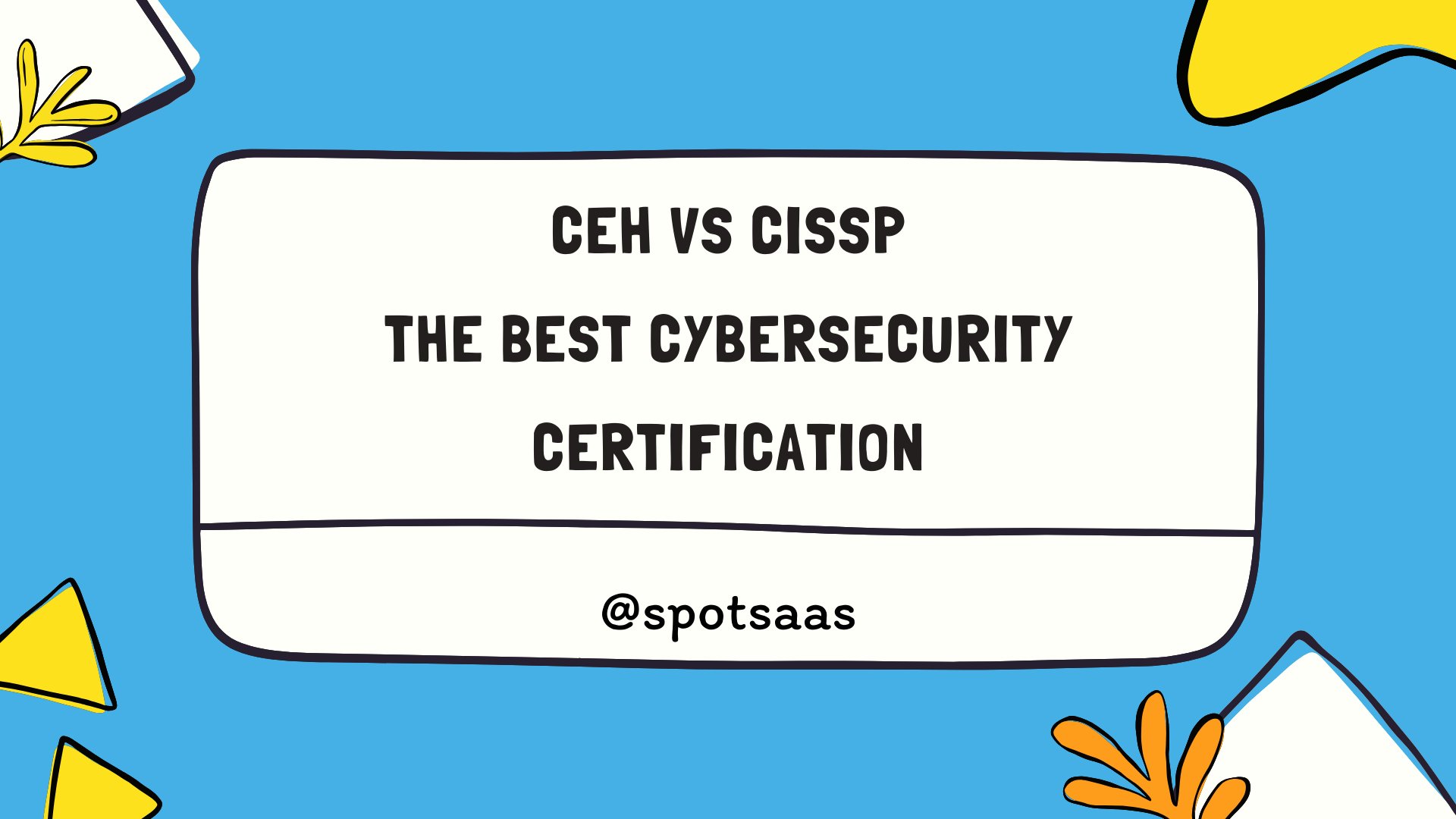Choosing the right cybersecurity certification can be a daunting task. One common dilemma is deciding between CEH (Certified Ethical Hacker) and CISSP (Certified Information Systems Security Professional).
This blog will guide you through the intricate details of both these certifications, helping you make an informed decision.
Key Takeaways
- CEH (Certified Ethical Hacker) certification equips professionals with skills to identify vulnerabilities in networks and systems.
- CISSP (Certified Information Systems Security Professional) certification demonstrates expertise in various areas of information security.
- CEH focuses on ethical hacking, while CISSP covers a broad range of security domains.
- Both certifications can enhance career opportunities and open doors to senior-level positions.
What are CEH and CISSP Certifications?
CEH (Certified Ethical Hacker) and CISSP (Certified Information Systems Security Professional) are two professional designations in the field of cybersecurity.
CEH (Certified Ethical Hacker)
The Certified Ethical Hacker (CEH) is a sought-after cybersecurity certification offered by the EC-Council. This credential validates an IT professional’s ability to think and act like a hacker, providing them with the necessary skills to identify vulnerabilities in an organization’s network or system.
Earning a CEH designation involves rigorous training on the latest security risks and advanced hacking techniques. The primary goal of this certification is to equip professionals with the knowledge needed to fortify their organizations against potential cyber threats.
A CEH-certified individual possesses proficiency in areas such as intrusion detection, penetration testing, risk assessment and virus creation.
CISSP (Certified Information Systems Security Professional)
The CISSP (Certified Information Systems Security Professional) certification is a highly recognized credential in the cybersecurity industry. It validates an individual’s expertise and knowledge in various areas of information security, including risk management, cryptography, network security, and access control.
With this certification, professionals can demonstrate their ability to design and implement secure systems that protect organizations from cyber threats. Obtaining the CISSP certification can greatly enhance career opportunities in the cybersecurity field and open doors to senior-level positions with attractive salary packages.
Thought you might like searching for –
Find Best Data Center Security Software
Advantages of CEH and CISSP Certifications
CEH certification provides professionals with the skills and knowledge needed to identify vulnerabilities and weaknesses in a network, while CISSP certification demonstrates expertise in various domains of information security.
Advantages of CEH
CEH certification offers several advantages for those looking to pursue a career in cybersecurity. Firstly, it provides individuals with a comprehensive understanding of ethical hacking and information security, enabling them to identify vulnerabilities and protect organizations from cyber threats.
Secondly, CEH certification enhances job prospects by demonstrating expertise in cybersecurity testing and ethical hacking techniques, making professionals highly sought after in the cybersecurity industry.
Additionally, CEH certification validates one’s skills and qualifications, allowing them to stand out among other candidates when applying for cybersecurity positions. Obtaining CEH certification not only opens up new opportunities but also equips professionals with the necessary knowledge and credentials to excel in their cybersecurity careers.
Advantages of CISSP
CISSP offers several advantages that make it a valuable certification for anyone looking to enhance their career in cybersecurity. First and foremost, CISSP is widely recognized and respected within the industry.
Holding this certification demonstrates a high level of expertise in information security and opens up new opportunities for professionals. Additionally, CISSP covers a broad range of topics including risk management, asset security, and network security, making it a comprehensive credential for individuals looking to gain proficiency in various aspects of cybersecurity.
Furthermore, CISSP holders often enjoy higher salaries compared to non-certified professionals, as employers value the knowledge and skills obtained through this certification. Overall, obtaining the CISSP certification can help individuals stand out in the competitive job market and advance their cybersecurity careers significantly.
Prerequisites and Cost of CEH and CISSP Certifications
To obtain the CEH certification, candidates must have at least two years of professional experience in information security and complete an official training course, while the CISSP certification requires a minimum of five years of work experience in at least two of the eight domains covered by the exam.
The cost for certification is around $1,199 for self-study materials and $2,999 for instructor-led training, whereas the cost for CISSP certification is approximately $699 for study materials and $699 to take the exam.
Prerequisites of CEH
To earn the CEH (Certified Ethical Hacker) certification, there are a few prerequisites you must meet. Firstly, you need to have at least two years of professional experience in the information security industry.
This ensures that candidates have a solid foundation of knowledge and practical skills before pursuing the CEH certification. Additionally, it is recommended that candidates have a strong understanding of TCP/IP networking and familiarity with various operating systems such as Windows and Linux.
Lastly, candidates should also possess basic programming skills as well as knowledge of databases and web technologies. Meeting these prerequisites will help applicants excel in the CEH certification process and further their cybersecurity careers.
Prerequisites of CISSP
To pursue the CISSP certification, there are a few prerequisites that you should meet. Firstly, you need to have at least five years of cumulative paid work experience in two or more of the eight domains covered by CISSP.
These domains include security and risk management, asset security, security architecture and engineering, communications and network security, identity and access management, security assessment and testing, security operations, as well as software development security.
Additionally, you can substitute one year of work experience with a four-year college degree or other approved credentials. It’s important to note that your work experience needs to be relevant to information systems security in order to qualify for CISSP certification.
Cost of CEH
The cost of obtaining the certification varies depending on several factors. On average, the exam fee for the certification is around $950. However, additional costs may include training materials, study guides, and practice tests which can range from $100 to $500.
It’s important to keep in mind that these costs are subject to change and it’s always recommended to check with official sources for the most up-to-date information regarding fees and expenses related to acquiring the CEH certification.
Cost of CISSP
Obtaining a CISSP certification does involve some costs. The exam fee for the CISSP certification is around $699 USD, which may vary depending on your location. In addition to the exam fee, there are also costs associated with study materials and training courses to help you prepare for the exam.
These materials and courses can range from a few hundred to a few thousand dollars. It’s important to consider these costs when planning your cybersecurity career path and budget accordingly.
Conclusion
CEH and CISSP certifications both offer valuable advantages for professionals in the cybersecurity industry. CEH focuses on ethical hacking and provides hands-on skills to identify vulnerabilities, while CISSP covers a broad range of security domains.
The choice between the two depends on career goals and interests. Ultimately, acquiring either certification can enhance one’s qualifications and open doors to exciting opportunities in the ever-growing field of cybersecurity.
FAQs
1. What is the difference between CEH and CISSP certifications?
CEH, or Certified Ethical Hacker, focuses on security testing while CISSP, Certified Information Systems Security Professional, emphasizes information assurance that requires a broader cybersecurity skill set.
2. Why should I consider obtaining cybersecurity certifications like CEH or CISSP?
Achieving cybersecurity qualifications such as the CEH or CISSP credential can enhance your profile in the IT security job market and strengthen your cybersecurity training experience.
3. How do these two IT certifications compare against each other?
When comparing certifications like CEH vs CISSP, one might find that while both boost professional credibility and are well-respected in their domains- CEH primarily concentrates on ethical hacking tools whereas CISSP provides a comprehensive overview of IT security concepts.
4. Can I choose to pursue both cybersecurity credentials simultaneously?
Yes! Certifications like CEH & CISSp can add value to any aspiring cybersecurity professionals but they require dedicated study time and potentially different hands-on experiences for successful completion.
5. Are there specific Cybersecurity jobs tailored toward either a certified ethical hacker (CEH) or a certified information systems security professional (CISSP)?
Indeed! While both provide important foundational skills for various roles within the IT security field; A Certified Ethical Hacker often works at testing system vulnerabilities whereas a person with a CISSP may gravitate towards managerial positions overseeing company-wide info-system securities.




